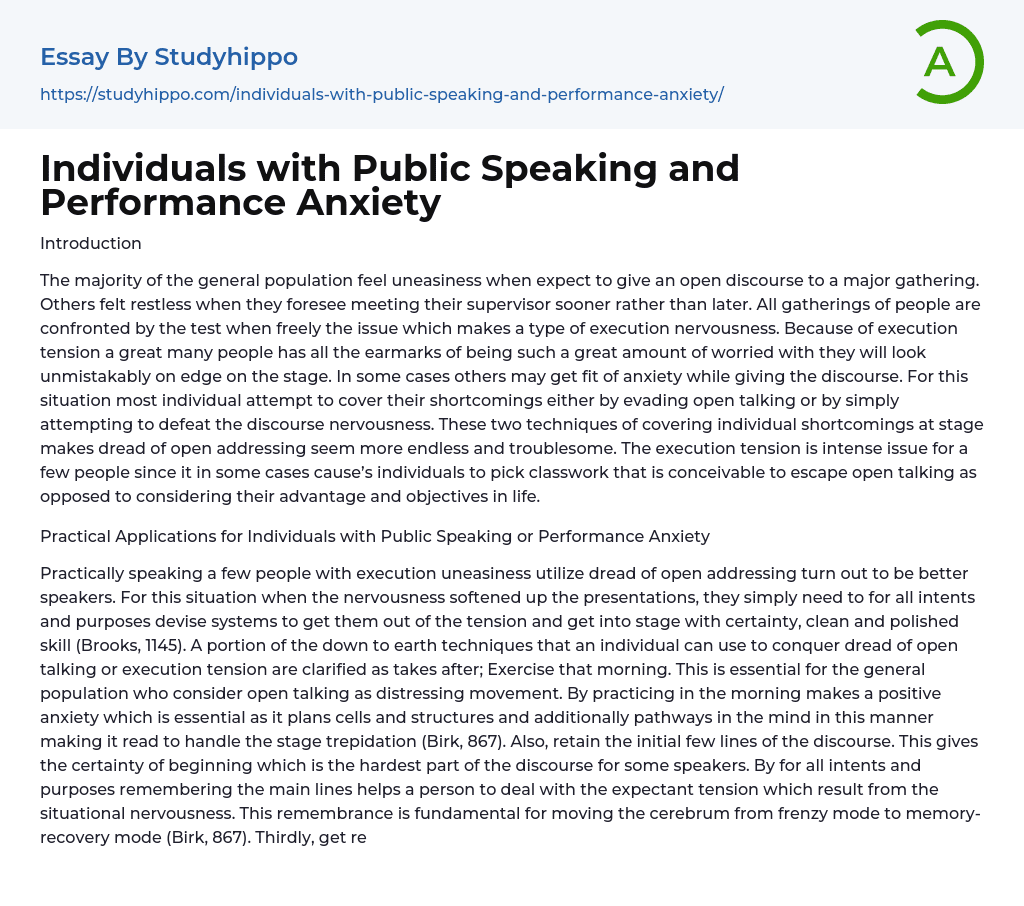

Individuals with Public Speaking and Performance Anxiety Essay Example
Introduction
The majority of people experience anxiety when asked to give a public speech in front of a large audience. Similarly, many feel anxious when they anticipate a meeting with their supervisor. All individuals face the challenge of dealing with performance anxiety in different situations.
Many individuals appear incredibly anxious on stage due to performance anxiety. Some may even experience panic attacks while giving a speech. In these instances, most people try to hide their weaknesses either by avoiding public speaking altogether or by attempting to overcome their fear. Both of these methods of concealing personal weaknesses on stage make the fear of public speaking appear more constant and challenging.
The issue of performance anxiety is a significant concern for some individuals because it often leads them to choose coursework that avoids public speaking, rather than considering their interests and goals in life.
...Practical Applications for Individuals with Public Speaking or Performance Anxiety
Practically speaking, some individuals with performance anxiety use fear of public speaking as a means to become better speakers. In this case, when the anxiety breaks during presentations, they just need to practically devise strategies to overcome it and approach the stage with confidence, polish, and professionalism (Brooks, 1145).
There are several practical techniques that individuals can use to overcome fear of public speaking or performance anxiety. One such technique is exercising in the morning. This is important for individuals who find public speaking stressful. Exercising in the morning creates positive stress, which prepares the cells, structures, and pathways in the brain to handle stage fright (Birk, 867).
However, keeping the initial lines in mind is crucial in managing the initial nervousness that comes with public speaking. It
helps transition the brain from panic mode to memory-recovery mode (Birk, 867). Additionally, instead of delivering a monologue, it is important to prepare for a conversation or engage in a discussion with a group of people to overcome social anxiety.
This would thus assist an individual in identifying areas of weakness and attempting to rectify them. It also enhances confidence while providing the discourse (Inagaki et al., 1359).
Application of the Knowledge Acquired to My Personal Life
The study has provided me with abundant information on public speaking or performance anxiety. This information can help me formulate strategies that can enable me to utilize the fears to become a better speaker (Amir et al., 862). The primary approach is to perceive the fear of public speaking as a type of motivation.
The fear of public speaking in this situation motivates me to prepare and practice in order to feel confident while on stage and deliver a successful speech. The information also helps me understand the fear of public speaking well. This allows me to interpret stage fright and channel my energy in a way that enables me to stay strong and confident enough to deliver a quality speech (Horwitz and Elaine, 116).
References
- Amir, Nader, et al. "The effect of a single-session attention modification program on response to a public-speaking challenge in socially anxious individuals." Journal of abnormal psychology 117.4 (2008): 860-894.
- Birk, L. Pharmacotherapy for performance anxiety disorders: occasionally useful but typically contraindicated. Journal of clinical psychology, 60(8), 2004.pp.867-879.
- Brooks, A. W. Get excited: Reappraising pre-performance anxiety as excitement. Journal of
Experimental Psychology: General, 143(3), 2014. 1144–1158.
"Language anxiety and achievement." Annual review of applied linguistics 21 (2001): 112-126.
- Tension essays
- Adhd essays
- Antisocial Personality Disorder essays
- Anxiety essays
- Bipolar Disorder essays
- Depression essays
- Depression And Anxiety essays
- Dyslexia essays
- Learning Disability essays
- Major Depressive Disorder essays
- Mental Disorder essays
- Mental Illness essays
- Psychosis essays
- Schizophrenia essays
- Stress essays
- Suicide essays
- Anxiety Disorder essays
- Emergence essays
- Post-traumatic Stress Disorder essays
- Free Speech essays
- Freedom Of Speech essays
- Gettysburg Address essays
- Informative Speech essays
- Persuasive Speech essays
- Public Speaking essays



